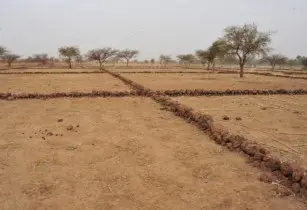In an effort to aid farmers who are dealing with tough farming conditions and restore farmland, Food and Agriculture Organization (FAO) has brought a state-of-the art heavy digger, the Delfino plough, to the Sahel region.
This is a part of its Action Against Desertification (AAD) programme, and will be used to cut through impacted, bone-dry soil to a depth of more than half a metre. Four Delfinos have been introduced into four countries – Burkina Faso, Niger, Nigeria and Senegal – as part of FAO’s Great Green Wall initiative.
The Delfino creates large half-moon catchments ready for planting seeds and seedlings, boosting rainwater harvesting tenfold and making soil more permeable for planting than the traditional and backbreaking method of digging by hand.
The half-moon is a traditional Sahel planting method which creates contours to stop rainwater runoff, improving water infiltration and keeping the soil moist for longer. This creates favourable micro-climate conditions allowing seeds and seedlings to flourish.
Moctar Sacande, coordinator of FAO’s AAD programme, said, "Restoring degraded land back to productive good health is a huge opportunity for Africa. It brings big social and economic benefits to rural farming communities. It’s a bulwark against climate change and it brings technology to enhance traditional knowledge.”
The importance of restored land
By bringing degraded land back to life, farmers do not have to clear additional forest land to turn into cropland for Africa’s rising population and growing food demands.
In Burkina Faso, for example, a third of the landscape is degraded. This means that the over nine million hectares of land that was once used for agriculture cannot be used any more, and it is projected that degradation will continue to expand at 360,000 hectares per year. If the situation is not reversed, forests are at risk of being cleared to make way for productive agricultural land.
Africa is currently losing four million hectares of forest every year for this reason, yet has more than 700 million hectares of degraded land viable for restoration.
In Burkina Faso and Niger, the target number of hectares for immediate restoration has already been met and extended thanks to the Delfino plough. In Nigeria and Senegal it is working to scale up the restoration of degraded land.
“Local engagement is essential. The whole community is involved and has benefitted from fodder crops such as hay as high as their knees within just two years. They can feed their livestock and sell the surplus and move on to gathering non-timer products such as edible fruits, natural oils for soaps, wild honey and plants for traditional medicine,” Moctar added.





